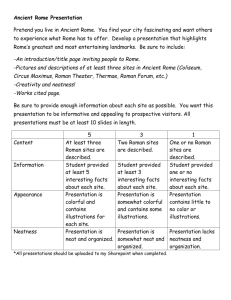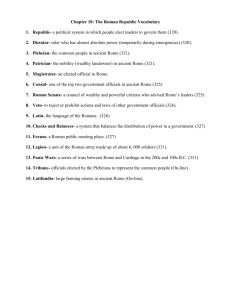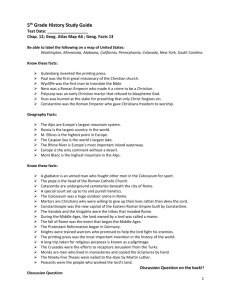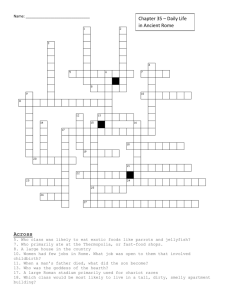Lesson 12- Absolute Power in History
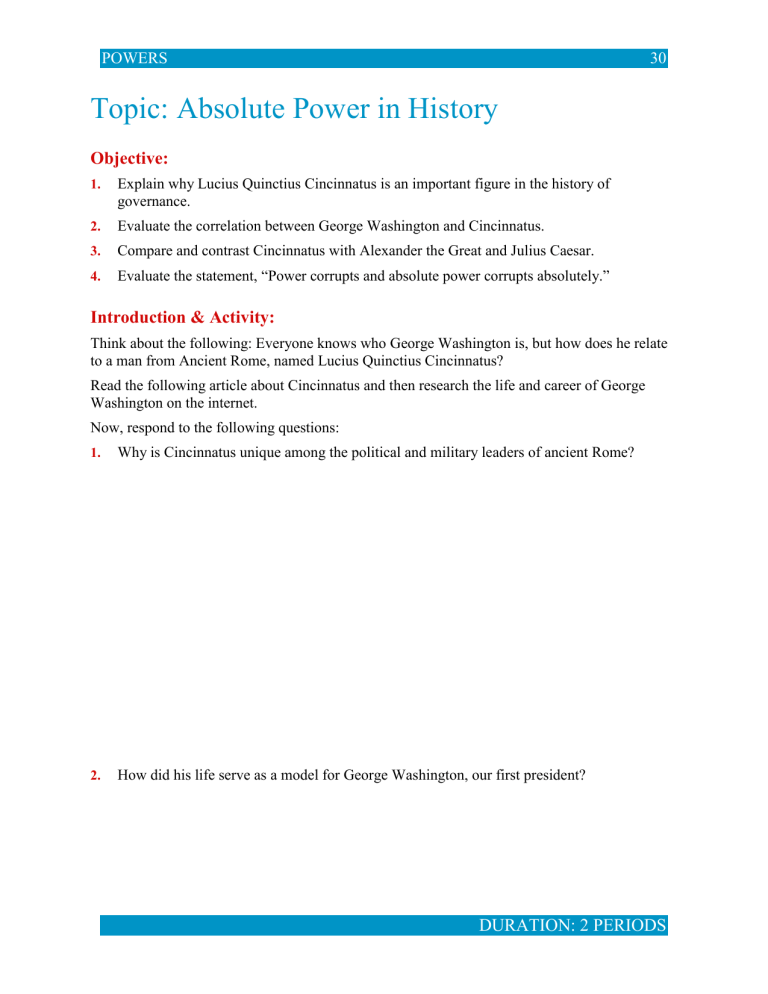
POWERS 30
Topic: Absolute Power in History
2.
3.
4.
Objective:
1.
Explain why Lucius Quinctius Cincinnatus is an important figure in the history of governance.
Evaluate the correlation between George Washington and Cincinnatus.
Compare and contrast Cincinnatus with Alexander the Great and Julius Caesar.
Evaluate the statement, “Power corrupts and absolute power corrupts absolutely.”
Introduction & Activity:
Think about the following: Everyone knows who George Washington is, but how does he relate to a man from Ancient Rome, named Lucius Quinctius Cincinnatus?
2.
Read the following article about Cincinnatus and then research the life and career of George
Washington on the internet.
Now, respond to the following questions:
1.
Why is Cincinnatus unique among the political and military leaders of ancient Rome?
How did his life serve as a model for George Washington, our first president?
DURATION: 2 PERIODS
POWERS 30
4.
3.
Compare and contrast Cincinnatus and either Julius Caesar or Alexander the Great. (You may need to briefly research one of these men if we have not gotten to it in the curriculum yet.)
After reading about these men explain your opinion about the following quote, “Power corrupts and absolute power corrupts absolutely.”
DURATION: 2 PERIODS
POWERS 30
DURATION: 2 PERIODS
POWERS
Lucius Quinctius Cincinnatus
30
"It is worth while for those who disdain all human things for money, and who suppose that there is no room either for great honor or virtue, except where wealth is found, to listen to his story."
Livy 3.26
In 458 BCE the fledgeling Roman Republic was in trouble. The city was under attack on two fronts by a couple of her ancient enemies, and the vaunted Roman Legions were having difficulty defending the borders simultaneously against two powerful foes. But it's certainly not like Rome to give up without a fight. Two armies were raised by the Senate to deal with these threats. The men of Rome fought bravely, but before long the town army's men were camped in was completely surrounded by the enemy army, who laid siege to the defenders in an effort to starve them out.
Knowing that half of Rome's standing army was in an engagement they had no chance of winning and were merely clinging to survival, the consul Minucius decided to send five of his fastest riders to Rome to ask for help. Despite the bleak situation, the Senators knew they still had one hope. There was a provision in the Roman Law that allowed for the appointment of a position known as Dictator. This position could be filled by the Senate in times of extreme crisis, and the man selected to perform this duty would have absolute, unchecked, unquestioned power over all aspects of the Republic and her armies. It was a risky move, but desperate times called for desperate measures. And the Senate knew just the man for the job.
Lucius Quinctius Cincinnatus was plowing the fields surrounding his humble farm, preparing another set of crops with which to feed his family, when he noticed a small group of riders approaching on the horizon. Cincinnatus recognized some of the men from when he served as consul a few years prior, but could not understand why these important
Senators would be visiting him on his quaint farmstead unannounced on this particular day.
When the men reached him, they informed him of the dire situation that lay before Rome.
The Republic was in great peril, and Cincinnatus was their last hope. He was the only man with the experience and proficiency to lead the Romans to victory over their enemies, and the senate was willing to provide him with supreme power with which to do so.
DURATION: 2 PERIODS
POWERS 30
Cincinnatus listened to the offer and quietly gazed back towards his home, where his wife had come outside to see what was going on. He knew that leaving the farm on this day would possibly mean death for him and his family, for they would surely perish from starvation if the crops were not sown this season. But he knew it was his duty to protect his people, and he could not turn his back on the Republic. With a heavy heart he kissed his wife and kids goodbye and headed for Rome.
Cincinnatus arrived at Rome, assumed the mantle of Dictator and went to work immediately. He appointed his Master of the Horse (second in command), shut down all private business in the City and put the population alert. He ordered all men of military age to put their weapons and armor together, collect twelve palisades and assemble on the
Campus Martius parade ground at dawn the next morning. All the women and men not suited for military service were to get in the kitchen and bake - preparing five rations for each soon-to-be-soldier in the city. The populace went into action immediately, since none of them are all that keen on having their town pillaged especially since that more than likely meant they'd all be either sold into slavery or slaughtered on the spot.
The following morning Cincinnatus rode out to the Campus Martius and addressed his ragtag group of citizen-soldiers.
They marched all day, reaching the Aequi siege by nightfall. Cincinnatus instructed his men to encircle the Aequi positions and drive their palisades into the ground, which served to intimidate the Aequi and announce the presence of Roman troops to the soldiers trapped in the town. All night and into the morning Cincinnatus' men built a huge wall encircling the
Aequi camp, leaving them encircled and boxed in between two Roman forces. As soon as the wall was completed, Cincinnatus personally led the Roman charge and the battle was on.
Minucius' men poured out the gates of the city and the Aequi, surrounded on two sides, were completely crushed. Within hours of fighting the surviving warriors and leaders threw down their arms at Cincinnatus' feet.
Cincinnatus didn't have any desire to execute these prisoners of war, but he did want to let them know that they couldn't get away with trying to antagonize Rome. He built a yoke out of spears, stripped the Aequi of everything except their clothing, and forced them to pass under the yoke. While it doesn't really sound like that big of a deal to us today, it was a symbolic act of defeat and subjugation.
To further add insult to injury Cincinnatus then plundered all the stuff that he forced the
Aequi to leave behind, dividing all the loot up amongst his men.
DURATION: 2 PERIODS
POWERS 30
After this, Cincinnatus and his men returned home as heroes. They were greeted at the gates of Rome by a throng of cheering citizens and were given a triumphal ticker-tape procession through the streets of Rome. Cincinnatus was formally recognized as a hero who had saved
Rome from the clutches of her enemies and near-certain defeat, slavery, and death.
With his work completed, Cincinnatus immediately resigned his post as Dictator and returned home to finish working his fields. He had been the supreme ruler of the Roman
Republic for only sixteen days.
While this is the most popular story involving Quinctius, it wasn't the only time the people of
Rome called on him to help them. In 439 BCE a man named Spurius Maelius attempted to incite a revolution amongst the plebians and overthrow the Roman government, so
Cincinnatus (who was 80 years old at the time) was again brought in and given Dictatorial power to deal with the situation. He had Maelius killed, razed the guy's home to the ground and then effectively placated the populace with his oratory prowess. Within about a week of being appointed Dictator, he again resigned and returned home to his family.
Lucius Quinctius Cincinnatus was the epitome of honor and personified the Roman ideal of duty to your country and your people above all else. He put aside his own personal needs to serve his homeland, and when absolute military and political authority was given to him, he didn't go the power-hungry route and seize control of the government or set himself up as supreme ruler for life - he did his job and then went home to his family when his work was finished. He single-handedly saved the Roman Republic from falling into the hands of her enemies and his tale served as inspiration for generations of Romans who came after him, illustrating the Roman values of civic responsibility and integrity.
DURATION: 2 PERIODS
POWERS
"What was wanted was not only a strong man, but one who was free to act, unshackled by the laws. He should therefore nominate Lucius Quinctius as Dictator, for he had the courage and resolution which such great powers demanded."
- Livy 4.13
30
DURATION: 2 PERIODS

